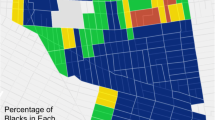Abstract
This study examines the socioeconomic and familial background of Irish Catholic priests born between 1867 and 1911. Previous research has hypothesized that lack of marriage opportunities may influence adoption of celibacy as part of a religious institution. The present study traced data from Irish seminary registries for 46 Catholic priests born in County Limerick, Ireland, using 1901 Irish Census returns and Land Valuation records. Priests were more likely to originate from landholding backgrounds, and with landholdings greater in size and wealth than the local average. Priests were found to originate from families with more sons than the national average, but with similar numbers of daughters. These findings are discussed in relation to competition for resources and lineage survival strategies.
Similar content being viewed by others
References
Abbott, E. A. 2001 A History of Celibacy. Cambridge, UK: Lutterworth Press.
Barrett, L., R. I. M. Dunbar, and J. Lycett 2002 Human Evolutionary Psychology. London: Macmillan Press
Bereczkei, T. 1998 Kinship Network, Direct Childcare, and Fertility among Hungarians and Gypsies. Evolution and Human Behavior 19:283–298.
Bereczkei, T., and R. I. M. Dunbar 2002 Helping-at-the-Nest and Sex-Biased Parental Investment in a Hungarian Gypsy Population. Current Anthropology 43:804–809.
Boone, J. L. 1988 Parental Investment, Social Subordination and Population Processes among the 15th-and 16th-century Portuguese Nobility. In Human Reproductive Behaviour: A Darwinian Perspective, L. Betzig, M. Brogerhoff Mulder, and P. Turke, eds. Pp. 83–96. Cambridge: Cambridge University Press.
Boone, J. L., and K. L. Kessler 1999 More Status or More Children? Social Status, Fertility Reduction, and Long-term Fitness. Evolution and Human Behavior 20:257–277.
Childs, G. 2001 Old-Age Security, Religious Celibacy, and Aggregate Fertility in a Tibetan Population. Journal of Population Research 18:52–66.
Cole, J. W., and E. R. Wolf 1974 The Hidden Frontier: Ecology and Ethnicity in an Alpine Valley. New York: Academic Press.
Connell, K. H. 1950 The Population of Ireland, 1750–1845. Oxford: Clarendon Press.
1968 Irish Peasant Society. Oxford:Clarendon Press.
Crook, J. H., and S. J. Crook 1988 Tibetan Polyandry: Problems of Adaptation and Fitness. In Human Reproductive Behaviour: A Darwinian Perspective, L. Betzig, M. Brogerhoff Mulder, and P. Turke, eds. Pp. 97–114. Cambridge: Cambridge University Press.
1994 Explaining Tibetan Polyandry: Sociocultural, Demographic and Biological Perspectives. In Himalayan Buddhist Villages, J. Crook and H. Osmaston, eds. Pp. 735–786. Bristol, UK: University of Bristol Press.
Crook, J., and H. Osmaston 1994 Himalayan Buddhist Villages. Bristol, UK: University of Bristol Press.
Crook, J., and T. Shakya 1994 Monastic Communities in Zangskar: Location Function and Organisation. In Himalayan Buddhist Villages, J. Crook and H. Osmaston, eds. Pp. 559–600. Bristol, UK: University of Bristol Press.
Duby, G. 1997 Women of the Twelfty Century, vol.2:Remembering the Dead. Chicago: University of Chicago Press.
Guinnane, T. 1992 Intergenerational Transfers, Inheritance, and the Rural Irish Household System. Explorations in Economic History 29:456–476.
1997 The Vanishing Irish: Households, Migration, and the Rural Economy in Ireland, 1850–1914. Princeton, NJ: Princeton University Press.
Hartung, J. 1976 On Natural Selection and Inheritance of Wealth. Current Anthropology 17:607–613.
Hill, E. 1999 Lineage Interests and Non-reproductive Strategies: An Evolutionary Approach to Medieval Religious Women. Human Nature 10:109–134.
Inglis, T. 1987 Moral Monopoly: The Catholic Church in Modern Irish Society. Dublin: Gill and Macmillan.
Keckler, C.N.W. 1997 Catastrophic Mortality in Simulations of Forager Age-at-Death: Where Did All the Humans Go? In Integrating Archaeological Demography: Multidisciplinary Approaches to Prehistoric Population, R.R. Paine, ed. Pp, 205–227. Carbondale: Center for Archaeological Investigations and Southern Illinois University Press.
Kent, J.P. 2002 On the Decline of Marriage in Rural Ireland, 1851–1911: The Role of Ecological Constraints and/or Developing Philopatry. Population and Environment 23:525–540.
Kerr, D.A. 1982 Peel, Priests, and Politics: Sir Robert Peel’s Administration and the Roman Catholic Church in Ireland, 1841–1846. Oxford: Clarendon Press.
Larkin, E. 1967 Economic Growth, Capital Investment, and the Roman Catholic Church in Nineteenth-Century Ireland. American Historical Review 72:852–884.
1972 The Devotional Revolution in Ireland, 1850–1875. American Historical Review 77:625–652.
Livi-Bacci, M. 1971 A Century of Portuguese Fertility. Princeton, NJ: Princeton University Press.
MacArthur, R.H. and E.O. Wilson 1967 The Theory of Island Biogeography. Princeton, NJ: Princeton University Press.
McEvoy, J. 1993 Carlow College, 1793–1993: The Ordained Students and the Teaching Staff of St. Patrick’ College, Carlow. Carlow: Carlovian Press.
Strassmann, B.I., and A.L. Clarke 1998 Ecological Constraints on Marriage in Rural Ireland. Evolution and Human Behaviour 19:33–55.
Vaughan, W.E. 1990 Potatoes and Agricultural Output. Irish Economic and Social History 17:79–92.
Vaughan, W.E., and A.J. Fitzpatrick 1978 Irish Historical Statistics: Population, 1821–1971. Dublin: Royal Irish Academy.
Wall, K. 1994 Peasant Stem of Families in Northwestern Portugal: Life-Changing Family Dynamics. Journal of Family History 19:237–259.
Author information
Authors and Affiliations
Corresponding author
Additional information
Denis Deady is currently a psychology doctoral student at the University of Stirling, Scotland. This paper is based on research from his MSc thesis in Evolutionary Psychology gained at the University of Liverpool.
Miriam Law Smith also completed the MSc in Evolutionary Psychology at the University of Liverpool and is currently a psychology doctoral student at the University of St Andrews, Scotland.
J. P. Kent is a lecturer in psychology at University College Dublin.
R. I. M. Dunbar is a professor at the University of Liverpool in the Evolutionary Psychology and Behavioural Ecology Research Group. Robin Dunbar’s research is supported by a British Academy Research Professorship.
Rights and permissions
About this article
Cite this article
Deady, D.K., Law Smith, M.J., Kent, J.P. et al. Is priesthood an adaptive strategy?. Hum Nat 17, 393–404 (2006). https://doi.org/10.1007/s12110-006-1002-2
Received:
Revised:
Issue Date:
DOI: https://doi.org/10.1007/s12110-006-1002-2




